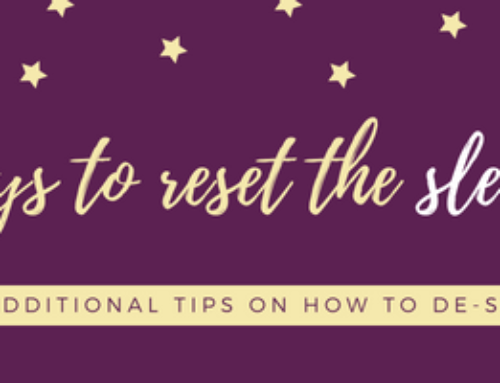My complete set of the Drowsy Dozen ways to get more sleep here including creating the best sleep environment, what to avoid and how to de-stress.
1Get plenty of exercise and fresh air. Isn’t that what our moms told us when we were growing up: get outside and play! Who knew it did more good than just to get us out of our mom’s hair! Not a fan of exercise or games? You don’t have to do crazy stunts, just go for a nature walk along a trail or along the shore. Connecting with nature is an amazing way to destress. You are focused on where you are: the sights, the sounds, maybe the discovery of a nest or footprints, maybe the soft shushing of the waves. You are practically forced to get outside of your thoughts and be present in nature. And, sometimes, just being alone and out of your environment helps clear your thoughts so you can see things more clearly. Not only will the fresh air and activity be good for you and your mental state, but you will also be more relaxed because you’ve done something fun and enjoyable. Just don’t exercise too close to bedtime.
2Try essential oils. Can’t hurt! There are many oils that can help you get to sleep and help you stay asleep. For example, Lavender is known for its calming effects and will help you to relax; Soothing blend Serenity contains lavender and other oils to help calm emotions and reduce worry from the stress of your day so you can sleep; Vetiver helps reduce nervous brain activity and helps stop your mind from racing. You can mix the essential oils with some epsom salts and drop them in a nice warm bath, you can diffuse them in your room during bedtime, you can spray some in a water mist onto your pillow, and you can even moisturize your feet with them. So soothing!
3Turn off screens and devices an hour before bedtime. Oh, man! Is this a hard one! Just before bed is the time when I feel like I can wind down and lose myself in a little facebooking. I really don’t feel like doing much else because I am so tired! What I recently learned was that the light from a screen actually activates your brain, so your brain doesn’t realise it’s time to go to sleep, and thus interferes with your ability to fall asleep. So, it’s time to try another wind-down activity such as having a bath, reading, deep breathing, or meditating (I am so bad at meditating that I frequently fall asleep!).
4Go to bed and wake up at the same time each night, even on the weekends. This routine will help reset your body and get it into a routine of sleeping consistently. If you’re like me, the waking up at the same time on the weekdays is not the issue. Luckily for me my 12 year old alarm clock has always been pretty punctual about what time he wakes me up! The hard part is doing it on the weekends when you would rather sleep longer and getting to bed earlier in the evening. One strategy that worked for me was to go to bed a few minutes earlier each night until I was going to bed at a reasonable (and boring!) hour. This earlier bedtime forced me to take time for myself in my new calming bedtime routine.
5Drink water. This is a tip I thought would be counterproductive: “Won’t I have to get up to go pee in the middle of the night?” Don’t drink a full glass if it’s before bedtime, but if you’re already up, have a half glass of water. That much water won’t make you have to go too soon, but it may refill your thirsty cells and help you get back to sleep. You may not be sleeping because your body is feeling dehydrated. Huh. Who knew?
6Don’t keep a clock where you can see it. I used to keep a clock nearby so I could check to see how much longer I had to sleep before I had to wake up. Instead, when I was really tired, I started checking the time to see how long I’d been awake, and how long it was taking me to go to sleep. This habit just promotes clock watching and becomes a stressor as you calculate how poorly things are going. Instead think, if I were taking a nap, twenty minutes would be perfect to give me some energy to keep going. So, even if I only get another 20 minutes of sleep, that will really help. This takes the pressure off: no more thinking about how little sleep you’re getting, and soon your mind will relax.
7Create the best sleeping environment. You want your sleeping environment to be welcoming, soothing, and have the best conditions to guarantee a great night’s sleep. First, keep your room dark and block out light from streetlights and sunrise. If your body detects light, it subconsciously thinks night time is over and it’s time to get up. So, help it stay in the night. Another great way to encourage sleep is with soothing noise. Use ambient noise machines or apps to drown out other noises and to create a soothing environment. Try the doTERRA whale diffuser with soft music or noises from nature. Finally, make sure your mattress and pillows are inviting, supportive and comfortable. Having the best conditions for sleeping will help you get to sleep and stay asleep better and longer.
8Avoid alcohol, caffeine and other stimulants especially in the afternoon and evening. The stimulant’s job is to give you energy and keep you awake. So, it follows that if you’re using them before bed time, you’re going to have a harder time getting to sleep and having a restful night’s sleep. Cutting back or opting out will help your body find it’s natural sleeping routine again. In addition, try not eating late night because this stimulates your digestive system and may interfere with sleep. (Also, not eating after dinner helps to keep the weight down – not that any moms would be thinking about that!)
9Get your hormone levels checked. Sometimes, sleep patterns are affected by fluctuating hormones ex., during and after pregnancy or during perimenopause. Ironically, if you don’t get enough sleep, this can affect your hormones, so the whole interaction becomes a vicious circle. So, find out about your estrogen levels and talk to your doctor about how to get better sleep.
10Limit activities that require alertness in bed. You want your brain to associate your bed with sleeping. (And, sex. Sex is ok – another way to relieve stress and get some sleep. Yeah, that’s the official excuse, if you need one!) If you do a whole lot of other thinking activities in bed, your brain is associating bed with brain work not with brain relaxing. Leave your work, the bills, and the shopping out of the bed. Use the bed for relaxing activities and sleep.
11Do your worrying before you get into bed. Sometimes we can’t get to sleep because our mind is worrying about what happened during the day or what needs to happen the next day. Cut it off a the pass. Before bed time, go over your previous day and think about your next day. Make your to-do list before you go to bed so you won’t have to make it in the middle of the night. Then, when it’s time for lights out, you have nothing to worry about.
12De-stressing techniques like meditation, prayer, deep breathing, or yoga also encourage good sleep. These techniques take the focus off of the stressful and busy times of the day and make room for calm and peace. In our busy lives, it’s so hard to sit still a while. We feel guilty that we should be doing something else. BUT. Taking a little time for quieting your mind, will actually give it a break and help you refocus to get those other things done more efficiently. Your body and your brain will benefit from a few minutes of escape, of connection with your peaceful inner self. How do you get started? There are many videos and sound recordings available online these days that you can use to guide or help you in these practices. Find one that you love (or at least can tolerate!) and start practicing it!


